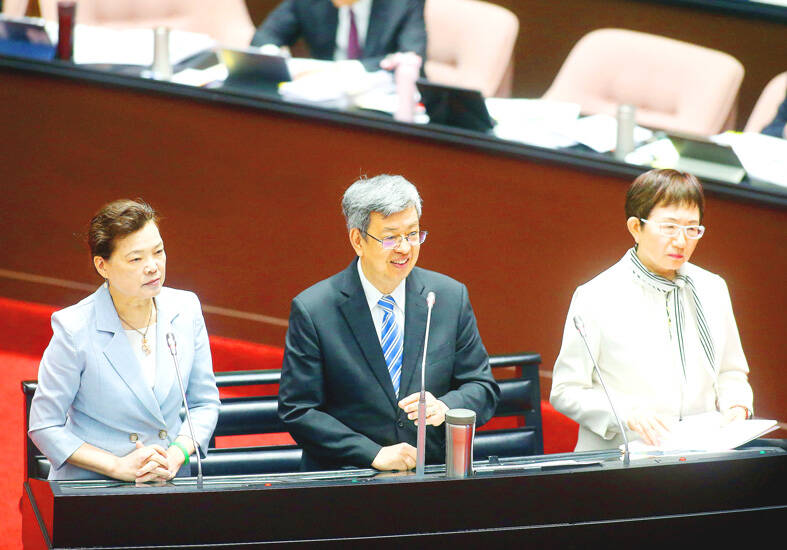The US Senate on Tuesday unanimously passed legislation affirming its support for the initial trade agreement reached under the US-Taiwan Initiative on 21st-Century Trade.
The bill, which cleared the US House of Representatives on June 21, was passed in the Senate by a voice vote, and is to be sent to US President Joe Biden to be signed into law within 10 days.
Taiwan and the US signed a first agreement under their “21st century” trade initiative on June 1, which covered customs and border procedures, regulatory practices and small business in a bid to make trade and investment between the two sides easier.

Photo: CNA
Following the signing, the two sides said they planned to begin negotiations on other, more complicated issues, such as agriculture, digital trade, labor, environmental and nonmarket policies and practices, and state-owned enterprises and standards.
In addition to granting approval for the initial agreement, the bill would ensure that Taiwan-US trade negotiations are subject to strict requirements on public transparency and congressional consultation, the US Senate Committee on Finance said in statement.
In Taipei, Premier Chen Chien-jen (陳建仁) yesterday called on the Legislative Yuan to approve the first-stage agreement during its extra legislative session, which started on Monday and runs through July 31.
Speaking to reporters, Chen dismissed criticism from opposition lawmakers that because the initial agreement does not include tariff relief, it would provide few tangible benefits to Taiwanese companies.
The deal’s trade facilitation measures — which standardize and streamline the import and export process — would ensure substantial benefits and savings, while providing a legal foundation for further expanding bilateral trade ties, he said.
Minister of Finance Chuang Tsui-yun (莊翠雲) told lawmakers that her ministry estimated that Taiwan’s customs declaration and courier companies would be able to save NT$100 million (US$3.22 million) in costs a year thanks to the deal’s trade facilitation measures.
The Presidential Office yesterday thanked the US Senate for passing the trade bill, saying the move indicated concrete action in support of trade relations between the two sides.
Presidential Office spokeswoman Lin Yu-chan (林聿禪) told reporters in Taipei that the passage of the bill by the US Senate and House was smooth and fast, demonstrating bipartisan support in the US for bolstering economic and trade relations with Taiwan.
The trade initiative is an important milestone in deepening US-Taiwan trade relations, the Ministry of Foreign Affairs said in a statement.
The foreign ministry said it would continue to work closely with the Executive Yuan’s Office of Trade Negotiations, US administrative departments and the US Congress to improve economic and trade relations between Taiwan and the US.

PREPAREDNESS: Given the difficulty of importing ammunition during wartime, the Ministry of National Defense said it would prioritize ‘coproduction’ partnerships A newly formed unit of the Marine Corps tasked with land-based security operations has recently replaced its aging, domestically produced rifles with more advanced, US-made M4A1 rifles, a source said yesterday. The unnamed source familiar with the matter said the First Security Battalion of the Marine Corps’ Air Defense and Base Guard Group has replaced its older T65K2 rifles, which have been in service since the late 1980s, with the newly received M4A1s. The source did not say exactly when the upgrade took place or how many M4A1s were issued to the battalion. The confirmation came after Chinese-language media reported

The Taiwanese passport ranked 33rd in a global listing of passports by convenience this month, rising three places from last month’s ranking, but matching its position in January last year. The Henley Passport Index, an international ranking of passports by the number of designations its holder can travel to without a visa, showed that the Taiwan passport enables holders to travel to 139 countries and territories without a visa. Singapore’s passport was ranked the most powerful with visa-free access to 192 destinations out of 227, according to the index published on Tuesday by UK-based migration investment consultancy firm Henley and Partners. Japan’s and

A Ministry of Foreign Affairs official yesterday said that a delegation that visited China for an APEC meeting did not receive any kind of treatment that downgraded Taiwan’s sovereignty. Department of International Organizations Director-General Jonathan Sun (孫儉元) said that he and a group of ministry officials visited Shenzhen, China, to attend the APEC Informal Senior Officials’ Meeting last month. The trip went “smoothly and safely” for all Taiwanese delegates, as the Chinese side arranged the trip in accordance with long-standing practices, Sun said at the ministry’s weekly briefing. The Taiwanese group did not encounter any political suppression, he said. Sun made the remarks when

BROAD AGREEMENT: The two are nearing a trade deal to reduce Taiwan’s tariff to 15% and a commitment for TSMC to build five more fabs, a ‘New York Times’ report said Taiwan and the US have reached a broad consensus on a trade deal, the Executive Yuan’s Office of Trade Negotiations said yesterday, after a report said that Washington is set to reduce Taiwan’s tariff rate to 15 percent. The New York Times on Monday reported that the two nations are nearing a trade deal to reduce Taiwan’s tariff rate to 15 percent and commit Taiwan Semiconductor Manufacturing Co (TSMC, 台積電) to building at least five more facilities in the US. “The agreement, which has been under negotiation for months, is being legally scrubbed and could be announced this month,” the paper said,